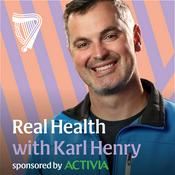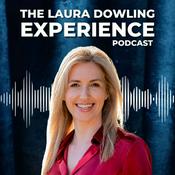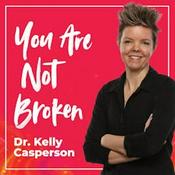Food Shrinks

54 episodes

Episode 54: Closing With a Bow: Healthy Endings, New Beginnings
05/11/2025 | 25 mins.
We end as we lived: real, funny, and unfiltered. In our finale, we model how to end something good in a healthy way. We talk about capacity, courage, and why saying "yes" to the next season sometimes means lovingly saying "no" to the current one. We reflect on what this show grew in each of us, share what's next (retreats, Liberation Modules, new podcasts, and programs), and leave you with resources to keep going. We're not disappearing; we're just changing the container. Big Ideas & Takeaways Healthy endings are a skill. Quitting isn't failure; it's a values-based boundary. Endings deserve clarity, care, and gratitude. Capacity is real. Every "yes" is also a "no." You can do many things, just not all of them well at once. Truth beats polish. Dropping the expert mask and telling the messy truth deepened our practice and connection. Recovery lives in seasons. A single year can hold relapse, repair, loss, joy, and growth. Self-compassion keeps us in the game. Community regulates. Being seen and accompanied is nervous-system medicine. Don't white-knuckle alone. Follow the energy. Passion projects can be bridges to the next right thing. Notice what lights up your body, and go there. Leave with a bow. End before resentment. Miss it a little. That's how you know you honored it. Notable Quotes "You can do it all… you just can't do it all well." "This isn't a breakup; it's a season shift." "Truth over PowerPoint." "We're ending it while we love it." "Take off the expert mask; keep the human." What's Next & Where to Find Us Clarissa & Molly P. — Sweet Sobriety https://www.sweetsobriety.ca IG: @sweet_sobriety Facebook Group: Sweet Sobriety Disordered Eating & Food Addiction Support Community You'll still hear us on the Food Junkies Podcast, including Clinician's Corner (monthly with Clarissa & Molly P.). Molly Carmel The Daily Ascent: weekday micro-episodes on mindset/spiritual practice (on all platforms + YouTube). Stop Starting Over System: 12-week open-enrollment program, opening Dec 8. IG: @mollycarmel • Site: MollyCarmel.com Resources Mentioned Food Junkies Holiday Series (podcasts + 3 hours of YouTube bonus Q&A) Thanksgiving/Christmas/New Year triggers https://www.youtube.com/watch?v=fe2h7Cn9kzo&t=1s

Episode 53 - Too Tired to Talk About Sleep Hygiene
28/10/2025 | 27 mins.
This week, the Food Shrinks are just plain tired—and they're talking about it. Not the kind of tired that a nap or a sleep hygiene checklist can fix, but the deeper exhaustion that comes from constantly giving, performing, and being "on." Together, Molly, Clarissa, and Molly explore: • The tug-of-war between push harder and please rest • Why rest can feel unsafe or "lazy" to a dysregulated nervous system • How hormones, overwork, and emotional load contribute to burnout • The link between fatigue, food patterns, and self-worth • Learning to rest without guilt—and without fearing you'll never get back up again • Finding micro-moments of rest and joy that don't derail recovery They share real stories about boundaries, people-pleasing, and those days when your body just says, "It's over, girl." This episode is a gentle permission slip to stop, breathe, and let rest be restorative rather than shame-inducing. ________________________________________ What You'll Hear: 🧠 How nervous system states (sympathetic vs. parasympathetic) affect fatigue 🌧️ The hidden costs of overdoing, overgiving, and emotional labor 💤 Why "doing nothing" can feel threatening—and how to reframe it 🥗 How exhaustion can influence food use, cravings, and control 💛 Micro-rest, intentional recovery, and letting go of guilt ________________________________________ Takeaways: • Rest isn't laziness—it's nervous system repair. • Doing the thing tired can sometimes help you thaw from freeze. • Emotional fatigue needs compassion, not productivity hacks. • Permission to rest is permission to recover. ________________________________________ 🎧 Listen, share, and join the conversation. If this episode resonated, email your questions or topic requests to [email protected] and hit subscribe to support the show and this growing recovery community. The content of our show is educational only. It does not supplement or supersede your healthcare provider's professional relationship and direction. Always seek the advice of your physician or other qualified mental health providers with any questions you may have regarding a medical condition, substance use disorder, or mental health concern.

Episode 52: Soft Serve, Sadness, and Starting Over - Grief in Recovery
21/10/2025 | 21 mins.
Today, we answer a listener who writes: "I'm grieving the foods I don't eat anymore—social stuff and celebrations are hard." The Food Shrinks open that door wider: grief in recovery isn't just about food—it's also the lost years, missed moments, and identities we're shedding. With humor and honesty, they explore how to honor grief without letting it become the story that drags you back. What We Talk About • Food grief vs. life grief: missing certain foods and mourning lost time, health, self-trust, and presence • "Not enough / too much" feelings and how dysregulation, ADHD/RSD, and early messages amplify them • Belonging cues & tradition: why cravings spike at holidays, patios, and summer rituals • From shame to compassion: grief as a normal (and healthy) part of change • Living amends: shifting focus to the life you're building now • Feelings ≠ stories: noticing a longing without turning it into a relapse script • Biopsychosocial-spiritual lens: why this isn't a 21-day habit swap Key Takeaways • Grief is allowed. Unacknowledged grief is riskier than naming it. • Struggling ≠ failing. You're learning a new way to live. • Let feelings pass. Don't let a moment of longing become a narrative. • Rituals matter. Re-create connection and celebration without the substance. • Progress over perfection. If you slip, the world doesn't end—stand back up kindly. Quotes to Remember • "Don't let a feeling become a story." • "Just because you're struggling doesn't mean you're failing." • "Unacknowledged grief keeps us stuck; acknowledged grief moves with us." Keep in Touch 💌 Questions or topic ideas? [email protected] If this episode helped, please subscribe and leave a quick review—it helps others find recovery and hope. The content of our show is educational only. It does not supplement or supersede your healthcare provider's professional relationship and direction. Always seek the advice of your physician or other qualified mental health providers with any questions you may have regarding a medical condition, substance use disorder, or mental health concern.

Episode 51: Am I Too Much or Not Enough? Healing the Inner Battle Beneath the Food
14/10/2025 | 21 mins.
In this deeply relatable episode, the Food Shrinks— tackle one of recovery's most persistent companions: the belief that we are not enough… or sometimes too much. From early childhood conditioning to nervous system dysregulation, the trio explores how these painful stories take root, how they drive people-pleasing and perfectionism, and why they so often lead us to use food for comfort or control. With honesty and compassion, they unpack their own journeys through shame, codependency, and recovery — offering tools to recognize when the "not enough" voice shows up, how to regulate through it, and how to begin standing in the truth of our inherent worth. What We Talk About • The "not enough / too much" paradox — and how both can exist at once • Why dysregulation and shame keep these stories alive • The role of ADHD, rejection sensitivity, and trauma in feeling unworthy • Early family messages that shaped how we seek validation • The long game of recovery: time, patience, and radical self-focus • How to practice compassion and curiosity instead of judgment Key Takeaways • Feeling not enough or too much isn't a personal flaw — it's often a trauma echo. • Awareness is the first step: notice when and where the story appears. • Shame is not fact; it's a state — and it softens through compassion. • You are not alone. Every person in recovery wrestles with these feelings. • Standing in your truth means choosing yourself again and again — with time, patience, and love. If today's conversation resonated with you, we'd love to hear from you. 💌 Email your questions to [email protected]. And if you found this episode supportive, please hit subscribe and leave a quick review — it helps others find their way to recovery and hope. The content of our show is educational only. It does not supplement or supersede your healthcare provider's professional relationship and direction. Always seek the advice of your physician or other qualified mental health providers with any questions you may have regarding a medical condition, substance use disorder, or mental health concern.

Episode 50: When Sugar Feels Like Oxygen
07/10/2025 | 21 mins.
The crew normalizes why sugar becomes the go-to "tool" for anxiety, boredom, and stress—and offers harm-reduction pathways that build capacity without shame. You'll hear personal recovery pivots (like treating your recovery as seriously as your addiction), crowd-out strategies, micro-delays for cravings, and how to use community even if you don't feel like it. This is practical hope: tiny, doable steps that add up. What We Cover • You're not hopeless—you're human: Brains repeat what works for relief. That's learning, not moral failure. • Add before you subtract: "Crowd out" by adding protein, fiber, and structure before trying to remove sugar. • Environment tweaks (not ultimatums): Out of sight storage, partner hides, garage stashes, plating treats at the table vs. eating from the bag. • Micro-delays for cravings: 10–20–60 seconds → a few minutes → an hour. Build the "wait" muscle. • Choose your hard, but choose support: We rarely recover alone; groups, meetings, lives, or any community can be anchors. • Treat recovery like it's as big as the addiction: Boundaries around meal times, bedtime eating, social plans, and high-risk settings. • Compassionate curiosity: If you do eat it, slow down, plate it, and notice what it's solving—then find other ways to meet that need. Practical Try-This List • Protein + Produce First: Keep easy protein (rotisserie chicken, eggs, edamame) and a "default veg" ready three ways this week. • Plate & Pause: If you're having the thing, put it on a plate, sit at the table, and take 3 slow breaths first. • 10-Second Ladder: Delay 10s → 30s → 2m. Text a friend while you wait. • Out-of-Sight Ops: Ask a partner/roomie to store trigger foods out of view (garage, trunk, top shelf bin). • One Boundary This Week: Pick a single non-negotiable (e.g., "no eating after 7pm" or "no eating in the car"). • One Connection Anchor: Pick one community touchpoint (a meeting, live, or accountability check-in) and show up. Host Insights • Molly C.: "My recovery only started working when I treated it like the serious condition it was—my recovery had to be as big as my addiction." • Clarissa: "I didn't have the skills yet, so I built a 'home treatment' season—invited people over when I didn't want to, because it kept me safe." • Molly P.: "Years of tool-building mattered. Curiosity over shame lets you add supports first and make removal feel possible later." Key Takeaways 1. Hope is a skill you practice, not a feeling you wait for. 2. Add supportive structure before subtracting the substance. 3. Micro-wins compound. Ten seconds today can become an hour next month. 4. Community is medicine. You don't have to like it to benefit from it. Share your question or topic Email: [email protected] If this episode helped, please follow, rate, and review—it helps others find the show and keeps these conversations going. 💜 The content of our show is educational only. It does not supplement or supersede your healthcare provider's professional relationship and direction. Always seek the advice of your physician or other qualified mental health providers with any questions you may have regarding a medical condition, substance use disorder, or mental health concern.
More Health & Wellness podcasts
Trending Health & Wellness podcasts
About Food Shrinks
Listen to Food Shrinks, Are We There Yet ? with Kathryn Thomas. and many other podcasts from around the world with the radio.net app

Get the free radio.net app
- Stations and podcasts to bookmark
- Stream via Wi-Fi or Bluetooth
- Supports Carplay & Android Auto
- Many other app features
Get the free radio.net app
- Stations and podcasts to bookmark
- Stream via Wi-Fi or Bluetooth
- Supports Carplay & Android Auto
- Many other app features


Food Shrinks
download the app,
start listening.




































